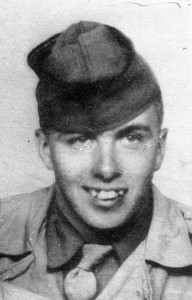
December 16, all hell broke loose: the start of the Battle of the Bulge. The Germans were everywhere. They hit us with 1900 heavy artillery, 250,000 soldiers, 100 large tanks, and other assault weapons. On an eighty-mile front we had 75,000 men in this area: the Ardennes. The weather was very cold, 10 to 20 below zero, heavy wind and snow. The sky was overcast so our Air Force could not come to help. Everyone had frozen feet, hands or faces. We were low on food, ammo, gas, and our heavy winter clothing had not arrived. Most of our communications were knocked out. “We were all on our own fighting as single units. We found other units and organized into a unified fighting force as best we could. The Germans at this point were desperate. They were using every combat unit they had left to try to stop the Allied drive into mother Germany.
The SS were inhuman at this point, they killed everyone; old men, women and children. They burned everything and shot POWs. This was the only time I saw American troops kill German soldiers that tried to surrender. If they wore black uniforms of the SS, they were shot. At Baugnez, Belgium, the SS shot over 100 American POWs. This was called the Malmedy Massacre because there was a sign at Baugnez pointing to Malmedy, which was two or three miles down the road.
I cannot describe the cold, hunger and atrocities that the Allied troops were subjected to in the Battle of the Bulge from December 16, 1944, until January 25, 1945. We fired and ran, bled and ran, until we were out of ammo and gas, then we looked for American tanks and trucks that were disabled and took what we could use from them. One day we got lucky, several boxes of K rations were on a truck. With very little food we would heat water (from snow) and drink that.
Our last fire mission in the Battle of the Bulge was to support the 4th Armored Division and the 318th Infantry of the 80th Division, break through, and relieve the 101st Airborne at Bastogne, Belgium. When the Battle of the Bulge ended, 81,000 allied and 125,000 Germans were dead. This battle broke the back of Hider’s army. We met only pockets of resistance after this battle. Christmas 1944 we were still in the Battle of the Bulge just outside of Bastogne, Belgium with snow knee-deep and cold as hell. We had cold K rations for dinner. I would have given anything for a hot cup of coffee and a pair of dry socks. We were hit by mortars and heavy artillery all day. I was sure it would be my last Christmas, but thank God I lived to see the New Year come in. Between Christmas 1944 and New Year’s Day 1945, we were under fire, in fact, we were being shelled continually, until the middle of February 1945, by German tanks and infantry mortars.
After February 1945, the war changed and we went on the offensive. One day when I was on guard duty, I went out to my half-track to relieve the man on guard. He couldn’t get out of the gun turret. His overcoat was wet when he got in and it froze so he couldn’t get out. The day I froze my feet, hands, and face, our half-track hit a land mine and blew the right front wheel off-—it was below zero, windy and snowing. We went into a woods looking for shelter. We didn’t find any so we cut some branches off the evergreen trees to make a windbreak. I went to sleep and when I woke up I didn’t have any feeling in my feet or hands, and my face was gray. It was daylight so we started a fire. Most of the crew had frozen parts. The fire saved us. I know several soldiers froze to death that night.
The next day we destroyed our machine guns, set fire to the half-track, then we walked until we located our outfit 633 AAA in a town. There, we got another half-track that had bad luck also, but that crew was all killed. We fixed two flat tires and we were back in action. Two days later, we helped liberate the 101st Airborne at Bastogne, Belgium, near Pont-a-Mousson, France, on the Moselle River. We heard a very odd sound. This was the first time I saw one of Hitler’s buzz bombs. It went directly over us at about three hundred feet. It was noisy but not as bad as the German screaming meemies. They sounded like a thousand teenagers at a rock concert in a small room.
War is hell—hot and cold. Normandy was hot hell—the Battle of the Bulge was cold hell. You are always cold or hot, it is raining or snowing, you are thirsty, tired, have diarrhea, your feet are sore, you are dirty, itchy and you stink. You hurt all over and chafe, afraid because a few miles away, an enemy artilleryman is about to kill you, or just over the next hill an enemy infantryman is going to try to kill you before you kill him. Before the firefight starts you can step on a mine and blow your legs off. Your buddies are always getting injured, your hands are sore and bleeding, Ups chapped; there is no privacy. Everyday happenings are twisting an ankle, smashing a thumb in the bolt of a weapon, cutting a hand on a ration can, chipping a tooth, tearing off a fingernail trying to shore up the ceiling of your underground hold. You get rheumatism from living in wet foxholes and sleeping in cold water and mud. No one said anything about how you smelled because everyone smelled bad. These are some of the joys of combat living. Get careless and you die. Combat soldiers are very close, they will risk death to save another soldier and think nothing of it.
